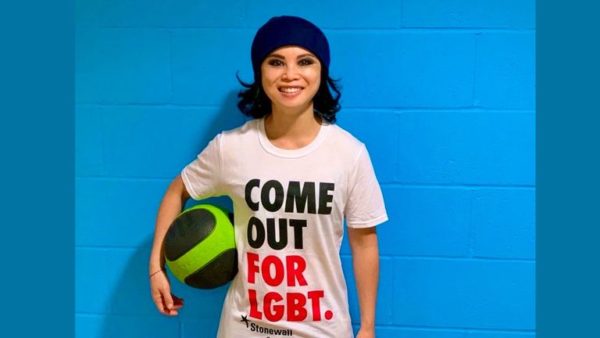
Amazin LeThi has been on a unique journey in sport and continues to be a visible force for inclusion
Amazin LeThi’s younger self is never far from her thoughts – a girl left by her mother in a Saigon orphanage, who would grow up in the Sydney suburbs loving sport but not seeing herself reflected in it.
A former competitive bodybuilder, she advocates now to be a mirror image for others. “I’m very visible,” she tells Sky Sports. “By sharing my story, it allows struggling Asian kids to know they’re not alone. So many of us feel isolated, thinking no one else shares our experience.”
Those experiences of struggling Asian youth often feature common threads – discrimination, cultural pressures, stereotypes, a lack of representation – and by harnessing sport and its power for change, LeThi is helping to dismantle prejudice and other barriers to progress.
Her own journey has been remarkable. She left Vietnam for life as a foster child in Australia; took up weightlifting so she could stand up to bullies (seeing no one else like her, her childhood idol was Arnold Schwarzenegger); and endured a spell of homelessness during her teenage years. By the time she was a young woman, she had amassed considerable physical and mental fortitude.
Before her bodybuilding career ended, she began to channel her energies into activism, setting up The Amazin LeThi Foundation with a mission to campaign and advocate for LGBTQ equality through sports and support LGBTQ youth experiencing homelessness through innovative programming.
In the USA, she works with Athlete Ally, for whom she is an ambassador, GLAAD, the United Nations and the LGBTQ Institute. She was invited to a White House function to discuss LGBTQ rights during the Obama presidency and has since become an in-demand speaker and consultant.
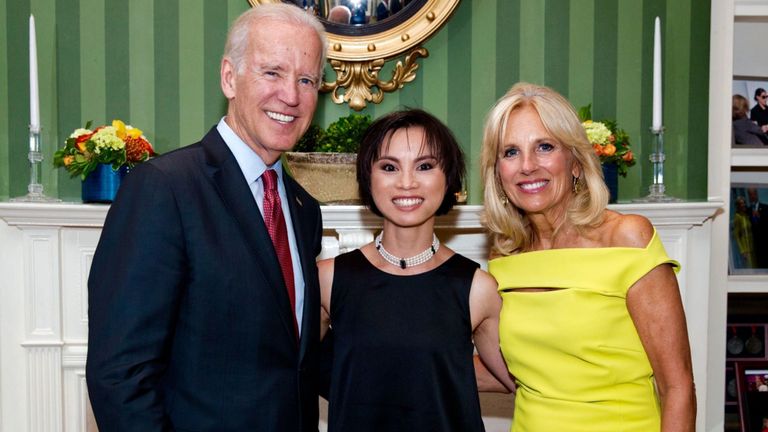
LeThi met then-Vice President Joe Biden and his wife Jill at an official reception in Washington D.C.
LeThi is now growing her UK profile – she was among the group of Stonewall Sport Champions appointed by the equality charity during last year’s Rainbow Laces campaign activation – and part of her long-term focus is to build support in this country for her self-created leadership and education programme, which uses the life lessons offered by sport to give disadvantaged young people the skills and confidence they need to forge successful careers.
“I wrote this programme because it was something that I always wanted,” she explains. It was the first of its kind when launched in Asia, and won the backing of the US and Dutch embassies, KPMG and Nike Vietnam, among others. “There are numerous studies now that show that when hiring someone, if they come from a sports background, they are far better employees because of the skillset that they have.”
‘A fantastic example’
LeThi recently met with a group of athletes from grassroots clubs in the Out For Sport family in London and the South East, who each spoke about various challenges they have encountered which relate to being Asian and British Asian. “Their stories are all different, but there’s a continuing theme of being from a minority background and facing difficulties,” she says.
Helping to shift cultural attitudes is one objective. As a teenager in Kent, Faye Easton discovered she was a talented hockey and rugby player but would frequently find herself compared unfavourably with her more academically successful brothers by her well-meaning father.
“I always told him ‘you shouldn’t be comparing me’,” says Faye. “I knew my strengths were in sport, or more practical work. I felt he was only proud when I received sport recognition awards.” Increasingly, the pitch became her place to thrive – “it helped mould my character and I gained a lot of confidence” – to the point where she felt empowered while taking her coaching badge to call out a sexist comment made by the instructor.
She now works in physical education at a sixth-form college in Walthamstow and recently became the head coach of South London Stags, one of the UK’s newest LGBT-inclusive rugby union clubs. “I never thought I’d be coaching an inclusive gay rugby team, and I love doing it,” she says.
I’m so proud to be Stags head coach. To finally get to a point where the responsibility is on me… it’s a positive challenge.
Faye Easton
LeThi says Faye’s story is a “fantastic” example for Asian girls and young women who feel hemmed in by the expectations placed upon them. “She reminds me of myself. I went into bodybuilding – a very unusual sport for a woman, but especially an Asian woman.
“Cultural pressure is a major reason why you don’t see too many Asians in sports. When you’re an immigrant, your parents come over and want you in a stable job. We’re always pushed into academia, medicine or the finance sector. Sport is generally not seen as a career that we can make money in.
“To be able to break down stigmas and barriers within our own communities is so important. Sport is not just about being an athlete – you can be a coach, a broadcaster, or be in sports business.”
‘Face of the UK is changing’
LeThi says there is still a considerable way to go to break out of the association of Asians with very specific roles in sport. “When people turn on the TV and see a huge number of us in golf or figure skating, an unconscious thought forms that these are the only sports we can succeed in.
“Parents see that as a pathway to success, but only one per cent gets to that level. TV doesn’t show the hundreds of kids trying to become professional golfers or skaters. We have to promote that you can do well in all sports, it’s not just a couple that Asian people can be in.”
It’s more than just an observation. With the Commonwealth Games coming to Birmingham in summer 2022, LeThi fears seeing Home Nations teams that don’t reflect the UK’s Asian and British Asian population. Later in 2022, the results of the previous year’s Census will be released, and will inevitably show how that ethnic demographic has grown since the previous figure of 4.4m – or 6.9 per cent of the UK’s total population – was recorded a decade ago.
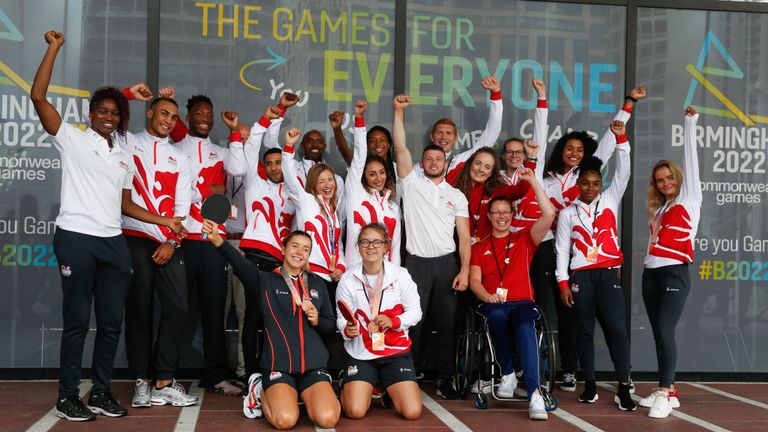
Team England athletes gathered in Birmingham last summer to mark the countdown to the 2022 Commonwealth Games
“In the next few years, all the major sports events happen to be in Asia,” she notes. “The UK is leading on equality, but we’re not having enough conversations about minority groups in sports. With Team GB, we’re sending our best people but we just don’t see British Asian faces. By 2022 in Birmingham, we should want to have a more diverse group of athletes. The face of the UK is changing but the face of British sports has not changed enough.”
As a champion for inclusion, LeThi draws upon her own experiences as an Asian woman who is LGBTQ and out. Regarding the latter, she identifies as ‘rainbow’ (an umbrella term in more common usage in Vietnam and Asia), and as an individual, she is better placed than most to discuss intersectionality – how characteristics and identities combine and overlap, and the effects that has.
“We’ve seen recently that Asian footballers are still on the receiving end of racism and if you’re LGBTQ on top of that, it would be very hard to come out,” she says. “You can hide your sexuality, but you can’t hide being Asian or black.
“It means that when we talk about dismantling homophobia and transphobia in sport, we also have to have these discussions around race and sexism. Sometimes it’s a double or even triple whammy that LGBTQ people of colour in sport might face when compared to their white counterparts.”
‘It comes down to visibility’
Ubaid-ul Rehman is the chair of Goslings, an LGBT-inclusive badminton club in London. Both were recognised at the recent Out for Sport Awards, held at City Hall. “I won the Team Spirit / Role Model award, which definitely ranks as my proudest achievement,” he says.
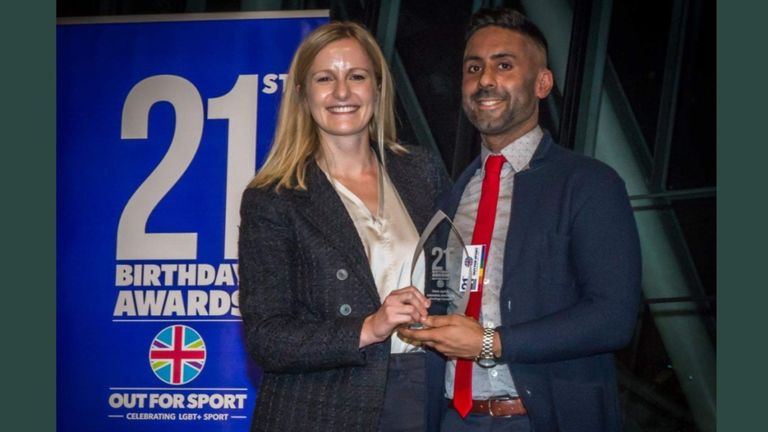
Ubaid-ul Rehman was honoured at the Out For Sport 21st Birthday Awards event at London’s City Hall last November
He overcame confidence issues just to put himself forward as chair two years ago and has since increased the club’s membership significantly, particularly for women, trans and non-binary people, which led to Goslings claiming the Most Inclusive Club award too. “Both new and current members regularly tell me how they feel valued and included with us, so it shows we’re doing something right,” he says.
Sport has always been a passion for Ubaid. “As a boy, I was never any good at football and cricket, and was often one of the last to be picked. I didn’t mind so much because I loved feeling part of a team.” He has a hearing impairment which makes some sports more difficult to play. When he was older, and looking for a social community within sport, he would face challenges as an out gay Muslim man too.
“Often racism encountered in sport isn’t overt or explicit. People may suggest things or assume things about me that are based on stereotypes, from small things such as ‘where are you really from?’ – for some reason not accepting that I’m from London – or they assume I’d be great at cricket just because I have a Pakistani heritage.”
Conversations around sexuality have the potential to make him feel awkward too. There can exist undercurrents of Islamophobia. “Some people assume I’m closeted and probably married to a woman. Sometimes I’ve been told I’m not like other Muslims, that I’m ‘one of the good ones’, unlike the others who ‘go around killing gays’.
“I’ve always tried to rise above all this, though. For me, it comes down to visibility. If I don’t put myself out there, I can’t challenge people’s assumptions and stereotypes. If someone thinks I’m not like the other Muslims, I can challenge them for having such thoughts.”
By being visible and dealing with perceptions and attitudes, I believe I’m helping to create better environments so that anyone can come to sports as their complete self.
Ubaid-ul Rehman, Goslings Badminton
He aims to set a good example, taking the time to ensure everyone feels welcome. “I’ve given people an awareness of how to approach people with a disability and not to be afraid to ask questions, even if you think you might make a mistake. Often just saying ‘can I help you?’ makes a huge difference.”
LeThi finds Ubaid’s story of breaking down barriers particularly inspiring; she says it underlines the importance of being an ally. “So much racism that minority groups face in the LGBTQ community come from within that community. There’s a lot of transphobia within the LGB community, too. I always emphasise that being an ally is what you say when I’m not in the room.”
For those who experience micro-aggressions, face assumptions, or are fearful of the suggestion that they are being untruthful in some way (the prospect of being asked to ‘explain’ yourself prevents many trans and non-binary people from being active), joining any sort of club can be hugely daunting.
“That’s why a lot of LGBTQ people drop out of sports, because they don’t feel it’s welcoming,” says LeThi. “So if you’re then from a minority background and you go to your local club and you don’t see yourself, it’s a difficult step to make.
“We can all help to change that, though – just by simple things like clubs displaying an LGBTQ sticker or flag, or mentioning on their flyers and social media that they’re welcoming for all. They should also have anti-discrimination policies and be easily accessible.”
A ‘safe haven’ in sport
Emily Chong, an experienced multi-sports athlete with London Frontrunners, wants to encourage people to be bolder, too. “Having the courage to join a club even though you don’t think you’re good enough is a vital first step,” she says. Her achievements demonstrate her fearlessness – qualifying for the Triathlon World Championship, endurance swims across the Strait of Gibraltar and Lake Geneva, completing the Austria Extreme Triathlon – but she knows sport can do much more to send out strong messages of equality, for all women.
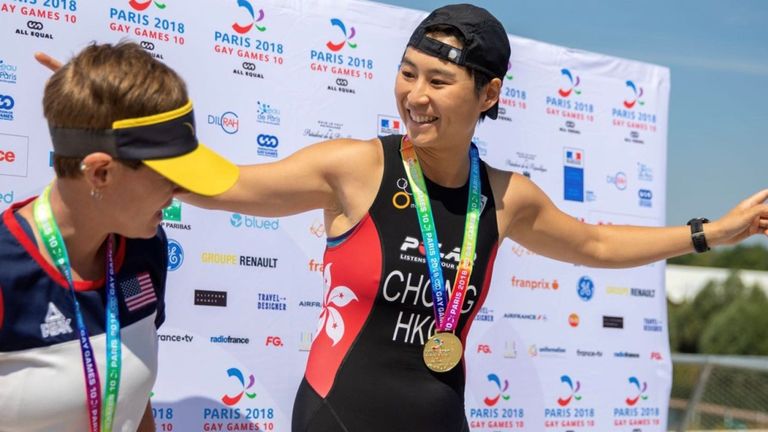
Emily Chong was a multiple medallist in triathlon and swimming at the Paris 2018 Gay Games
She works as a personal trainer and sports massage therapist. “There are things that bug me. Equipment rarely comes in small enough sizes – and when it does, it’s low-end gear or meant for children. Then there’s unequal prize money – the cycling world is notoriously bad for that, while cross-country running still insists on men running longer distances than women, even though women have been competing in marathons alongside men since 1973.”
Following Beijing 2008 and PyeongChang 2018, the Olympic Games returns to Asia this summer. Will Tokyo 2020 help to inspire the next generation of Asian athletes, competing in sports not seen as traditional? Will the visibility of Asian women in those sports grow? Will we see well-known Asian Olympians and Paralympians who are LGBTQ and out?
LeThi recognises the cultural pressures outside of sport. “In the Asian community, it’s all about coming home – ‘what are you doing for the family, what job are you going to get to support us, when are you going to get married?’
“And if they have an LGBTQ child, the parents start thinking, ‘oh my gosh, they’re never going to get married, we’re not going to have grandchildren’. What follows is a reluctance to even talk about it, because it’s all about not losing face.
“Shame, disappointment and failure are used so much within the Asian community to push LGBTQ people back into the closet and into very rigid gender stereotype roles as to what culturally they should and shouldn’t be in society.”
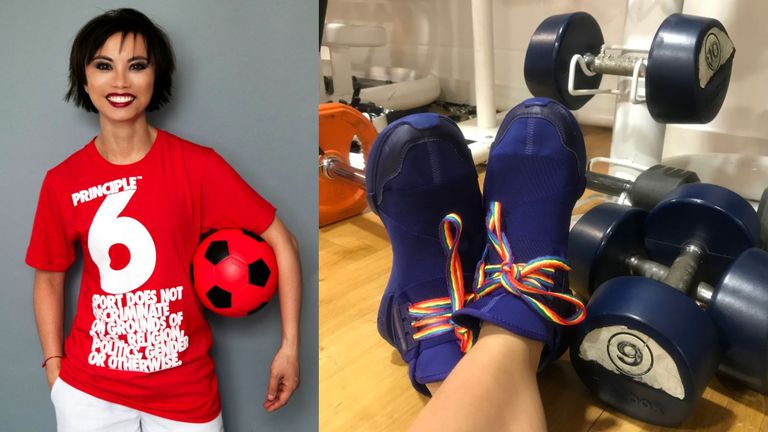
As a Stonewall Sports Champion, LeThi is helping to take the Rainbow Laces message into the British Asian community
Sports should be the arena which helps young Asian people break free from any such constraints, says Emily. “It was a safe haven for me, and a place in which I thrived,” she adds. “In my chosen sports – wakeboarding, martial arts, lacrosse, running, triathlon, and open water swimming – it was also the place where I saw the least racial discrimination.
“Efforts and results are recognised regardless of colour – you race against a fair field of people in your weight category or age group. It’s a place you’re not judged by how you look or what you wear.”
February is LGBT History Month in the UK – an opportunity to assess progress and visibility, while also looking to the future. LeThi says sports and the Asian community must be parts of that conversation and she is determined to be a voice for both.
“Sharing my story and living authentically and unapologetically gives me the freedom to realise that my emotions are real, that how I feel inside matters and that I’m worthy of owning the space that I’m in,” she writes in her Stonewall Sport Champion biography.
“I want my story to provide a positive message for any Asian athlete who wants to be openly out in sports and to remind them they are not alone.”
Visit Amazin LeThi’s official website at www.amazinlethi.com.
Sky Sports supports Stonewall’s Rainbow Laces campaign for LGBT+ inclusion in sport, as a member of Team Pride. If you’re interested in sharing your Rainbow Laces story, get in touch with us.




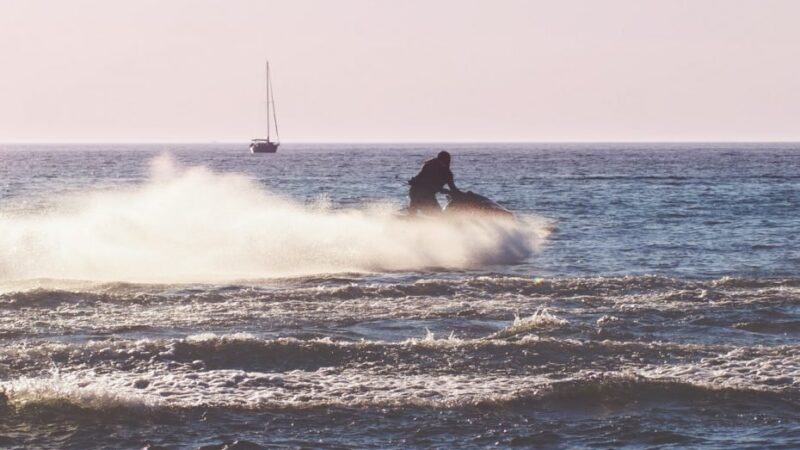
Recent Comments